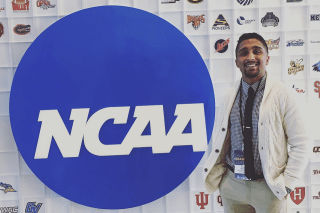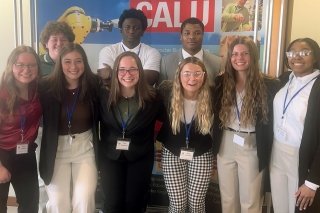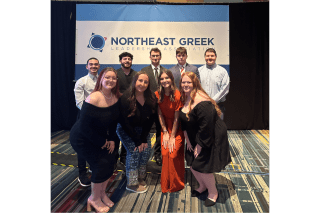NCAA seminar leaves lasting impression
Posted:

After four years as a NCAA Division III wrestler for Wilkes University, Pankil Chander decided he wasn’t done with college athletics yet.
This time around, he wouldn’t be an athlete, he’d be a mentor. Chander is learning how to help student athletes succeed from an organization that arguably knows the most about college athletics, the NCAA.
Chander is currently pursing his masters in Bloomsburg University’s Educational Leadership in College Student Affairs program. He is also a graduate assistant with the Dean of Students and Health and Wellness offices specifically working with the The Choices and Peer Assisted Student Success program. He is also a volunteer assistant coach for the Huskies wrestling team.
Earlier this year, Chander attended the 2018 NCAA Emerging Leaders Seminar in the organization’s hometown of Indianapolis. After a rigorous application process, Chander and 254 other graduate assistants and interns had been accepted to attend NCAA’s three-day program.
Chander’s experience at the seminar encouraged him to keep pursing a career in student athletics and taught him skills that will help him create better programs to help future student athletes.
“I gathered tangible insights from my peers and the speakers on a wide array of areas inclusive to student-athlete development, academics and life skills, collaborating with other partners on campus, alumni engagement and development, and dynamics of an athletic department,” Chander said.
One of Chander’s favorite quotes from the weekend came from Assistant Commissioner of the NCAA Big Ten Conference, Kerry Kenny, who recited a mantra common in the Big Ten Conference.
“Honor tradition and pivot towards innovation.”
“Kerry Kenny validated the essence and significance of my conviction in being introspective, and student-athlete centered in this industry,” Chander said. “I believe this experience reaffirmed my conviction in the purpose of this field.”
This seminar was unique to others because prior to arriving, attendees had been required to take a behavioral assessment. This assessment focuses on how an individual reacts in certain environments and how the individual would respond in particular situations. Using the results of the attendees’ assessments, the NCAA then divided and grouped individuals with varying types of behavioral styles. Groups of 10-12 individuals, were required to create a proposal of an event and what it would emulate, then present it in front of members of the NCAA organization.
Chander’s continued desire to work with student athletes also came from his holistic experience here at Bloomsburg.
“Between the Dean of Students Office, an engaged student cohort, rigorous and purposeful academics, and being on a coaching staff of our Wrestling program, I interact with a wide array of dispositions,” Chander said. “The one on one conversations I have with my supervisors, colleagues, students, all educate, and encourage my lens as a professional.”



